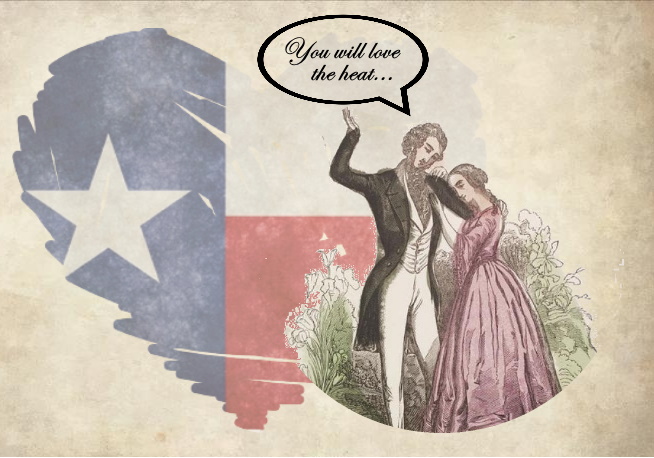
Late in 1837, many of the young women of Boston signed a petition beseeching the United States Congress not to allow the newly minted lone star of Texas to sully their national banner.
Francis Moore, Jr., editor of the Telegraph and Texas Register (and quite the card or cad, depending on how you read this) saw an opportunity for the men of Texas.
He published the following, which has picked up by many newspapers back east.
WARNING – overwrought nineteenth century language ahead!
To the most beautiful – the most lovely – the most accomplished, and fairest of the fair; alias the 3000 Young Ladies of Boston, who signed a petition to the Congress of the United States, against the annexation of Texas to the Union of the North.
Young Ladies –
We, your petitioners, bachelors, residing in the Republic of Texas, deeply aware of the important control which young ladies have over our destinies, have witnessed with humiliation and regret, your recent memorial to the Congress of the United States against the annexation of Texas to your happy Union.
We are the more mortified from the consideration, that in thus frankly expressing your disappointment of a national union, you show a disposition to oppose a union of a more domestic nature, by which our happiness would be more immediately connected.
We will not, however, shut out all comfort and consolation from our bosoms, by supposing that you cannot be persuaded to change your opinion; but still hope that a proper representation will induce you to change your position that you have assumed, and adopt as a rule of action, a course calculated to promote your own and our felicity.
We would then, humbly represent, that we have a country larger in extent than the kingdoms of France and Spain; with a sky as bright, and a climate as mild, as the south of Italy; our soil is equal in fertility to the delta of Egypt; with an atmosphere pure and healthful as the mountains of Circassia.
Our population is composed of the chivalrous of all nations, who rallied the the standard of the Single Star of the West. The battle has been fought and won: justice and chivalry have triumphed; and the God of Battles has given into our hands a country so supremely beautiful, that it would be invaluable, could we cull from our father-land, that “last best gift of heaven,” without which, Eden itself was a desert.
We are here, dear objects of our affection, without wives: we have not one woman to a hundred men; and it is this reflection which more sensibly embitters the course you have adapted towards us.
We are aware that the refinement of the age will not allow us to adopt the precedent set by the youth of Rome, in seizing upon the fair daughters of their Sabian neighbors; that now females have attained their proper sphere in society; they are no longer looked upon as slaves of their husbands, but as companions, equal in mind and capacity and superior in all the milder virtues which ennoble the human heart.
It is this reflection which renders your course painful in the extreme: but we will approach you with due reverence, humbly throwing ourselves upon your mercy, hoping to find your cosmos glowing with a different sentiment, than one expressed in your memorial to the Congress of the United States.
We would further add that ours is perhaps the only country on the face of the globe where a proper estimate is placed upon ladies.
Even before the declaration of our independence, one woman was considered equal in value to three men; for a single man received from the government, as a settlement right, but one-fourth of a league of land; whereas if he had a wife, he obtained four times that amount.
And such is the anxiety of our government officers to promote an emigration of the fair from other countries, with a probability of securing to themselves happiness in domestic life; (being nearly all bachelors) they have granted to each lady two-thirds of a league of land, as a dower to her husband, who she shall marry within the next twelve months. These considerations should prevent you from forming a hasty opinion against us.
In conclusion, if you will emigrate to our fair land, we will bind ourselves individually and collectively, to furnish you with good husbands, within between eight and ten months after your arrival upon our coast; and thus furnish you with a better employment than meddling with political questions which should interest your much less than your own domestic felicity.
All of which is respectfully submitted.
January 18, 1838
(signed by 3000 bachelors,whose names are omitted for want of room.)
Categories: Texas Culture, Texas history

Well don’t leave me hanging, did it work??? How many young ladies, or old, tespond??
I do declare that thy men of Texas were awestruck, and rightfully happy beyond their wildest expectations by the sheer number of willing female participants in answer to their plea.
Well, he was doing very well until he said that our place was in the home. I’d like to slap him.
Don’t slap him around, Bettie! It was 1837 and still, he wrote of us gals: “…that now females have attained their proper sphere in society; they are no longer looked upon as slaves of their husbands, but as companions, equal in mind and capacity and superior in all the milder virtues which ennoble the human heart.”
At the end when he refers to women staying out of politics and tending to “domestic felicity,” he’s saying “spend less time writing letters about Texas and more time finding a husband.” Marriage, then more than now, was vital to the advancement of both men and women.
And now refined Boston is a liberal run armpit of the world.
Well, I for one thought it was beautiful! Of course Im just an old conservative gal from Texas!